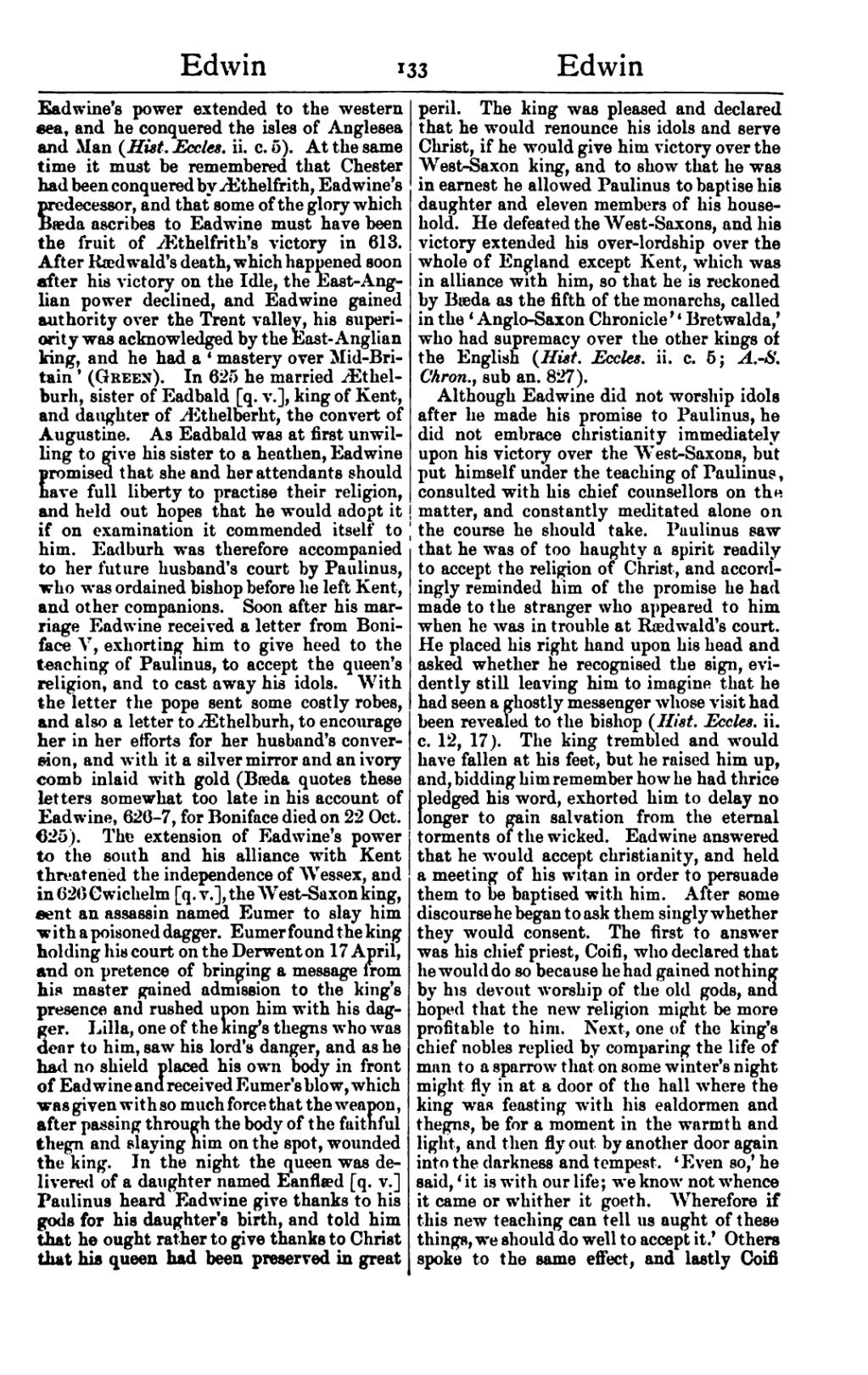Eadwine's power extended to the western sea, and he conquered the isles of Anglesea and Man (Hist. Eccles. ii. c. 5). At the same time it must be remembered that Chester had been conquered by Æthelfrith, Eadwine's predecessor, and that some of the glory which Bæda ascribes to Eadwine must have been the fruit of Æthelfrith's victory in 613. After Rædwald's death, which happened soon after his victory on the Idle, the East-Anglian power declined, and Eadwine gained authority over the Trent valley, his superiority was acknowledged by the East- Anglian king, and he had a 'mastery over Mid-Britain' (Green). In 625 he married Æthelburh, sister of Eadbald [q. v.], king of Kent, and daughter of Ælthelberht, the convert of Augustine. As Eadbald was at first unwilling to give his sister to a heathen, Eadwine promised that she and her attendants should have full liberty to practise their religion, and held out hopes that he would adopt it if on examination it commended itself to him. Eadburh was therefore accompanied to her future husband's court by Paulinus, who was ordained bishop before he left Kent, and other companions. Soon after his marriage Eadwine received a letter from Boniface V, exhorting him to give heed to the teaching of Paulinus, to accept the queen's religion, and to cast away his idols. With the letter the pope sent some costly robes, and also a letter to Æthelburh, to encourage her in her efforts for her husband's conversion, and with it a silver mirror and an ivory comb inlaid with gold (Bæda quotes these letters somewhat too late in his account of Eadwine, 626-7, for Boniface died on 22 Oct. 625). The extension of Eadwine's power to the south and his alliance with Kent threatened the independence of Wessex, and in 626 Cwichelm [q. v.], the West-Saxon king, sent an assassin named Eumer to slay him with a poisoned dagger. Eumer found the king holding his court on the Derwent on 17 April, and on pretence of bringing a message from his master gained admission to the king's presence and rushed upon him with his dagger. Lilla, one of the king's thegns who was dear to him, saw his lord's danger, and as he had no shield placed his own body in front of Eadwine and received Eumer's blow, which was given with so much force that the weapon, after passing through the body of the faithful thegn and slaying him on the spot, wounded the king. In the night the queen was delivered of a daughter named Eanflæd [q. v.] Paulinus heard Eadwine give thanks to his gods for his daughter's birth, and told him that he ought rather to give thanks to Christ that his queen had been preserved in great peril. The king was pleased and declared that he would renounce his idols and serve Christ, if he would give him victory over the West-Saxon king, and to show that he was in earnest he allowed Paulinus to baptise his daughter and eleven members of his household. He defeated the West-Saxons, and his victory extended his over-lordship over the whole of England except Kent, which was in alliance with him, so that he is reckoned by Bæda as the fifth of the monarchs, called in the 'Anglo-Saxon Chronicle' 'Bretwalda,' who had supremacy over the other kings of the English (Hist. Eccles, ii. c. 5j A.-S. Chron., sub an. 827).
Although Eadwine did not worship idols after he made his promise to Paulinus, he did not embrace Christianity immediately upon his victory over the West-Saxons, but put himself under the teaching of Paulinus, consulted with his chief counsellors on the matter, and constantly meditated alone on the course he should take. Paulinus saw that he was of too haughty a spirit readily to accept the religion of Christ, and accordingly reminded him of the promise he had made to the stranger who appeared to him when he was in trouble at Rædwald's court. He placed his right hand upon his head and asked whether he recognised the sign, evidently still leaving him to imagine that he had seen a ghostly messenger whose visit had been revealed to the bishop (Hist. Eccles. ii. c. 12, 17). The king trembled and would have fallen at his feet, but he raised him up, and, bidding him remember how he had thrice pledged his word, exhorted him to delay no longer to gain salvation from the eternal torments of the wicked. Eadwine answered that he would accept Christianity, and held a meeting of his witan in order to persuade them to be baptised with him. After some discourse he began to ask them singly whether they would consent. The first to answer was his chief priest, Coifi, who declared that he would do so because he had gained nothing by his devout worship of the old gods, and hoped that the new religion might be more profitable to him. Next, one of the king's chief nobles replied by comparing the life of man to a sparrow that on some winter's night might fly in at a door of the hall where the king was feasting with his ealdormen and thegns, be for a moment in the warmth and light, and then fly out by another door again into the darkness and tempest. 'Even so,' he said, 'it is with our life; we know not whence it came or whither it goeth. Wherefore if this new teaching can tell us aught of these things, we should do well to accept it.' Others spoke to the same effect, and lastly Coifi
